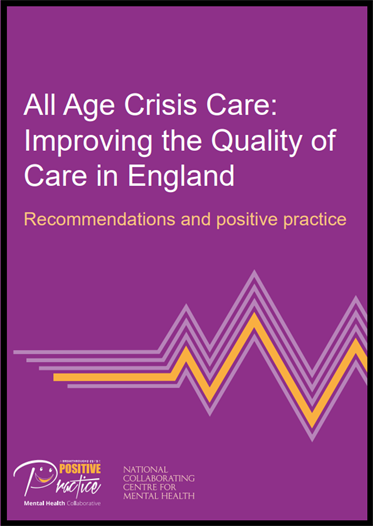All Age Crisis Care
Excellent work is being done in mental health crisis care around England. To bring examples of such services together, with the aim of encouraging services to share their learning and positive outcomes with each other, the Positive Practice in Mental Health (PPiMH) Collaborative asked the NCCMH to develop this report.
The report contains specific recommendations for the improvement and delivery of high-quality care, and it highlights exemplary services and initiatives that demonstrate those recommendations in practice.
Introduction
The Five Year Forward View for Mental Health made it clear that improving access to high-quality mental health care should become a national priority. Then, the Long Term Plan Implementation Framework committed to improving the responsiveness and availability of crisis care while developing local pathways that include a range of alternative services.
The recommendations in this report were developed from various pieces of work carried by the NCCMH on mental health crisis care. That work was done with the input of expert advisers, people with lived experience, people who work in services and those who work in partnership with them, and it resulted in a range of advice, guidance and principles.
Purpose and scope of this report
This report is for anybody who works in statutory or voluntary mental health crisis care, commissioners of these services and people who may need to access crisis care. Examples of positive practice are provided with each recommendation, to outline how each one can be achieved in practice.
How to use this resource
Download the full resource, which contains
- The full background and purpose of the report
- A definition of mental health crisis, services and care, with a checklist of what people experiencing a crisis should have access to
- A summary of recommendations for positive practice in mental health crisis care
- The 7 recommendations, with accompanying positive practice examples, which are about:
- Focusing on and working with the person
- Equal and inclusive access to care
- Getting the right help, in the right way, at the right time
- Appropriate and safe spaces
- Collaborative care and partnership working
- Having the right staff
- Ensuring a quality service
- A summary of contact details for the positive practice examples that have been included.


